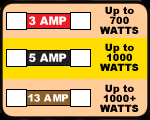 Go to main content
Go to main content
Archive Website of the UK government
Please note that this website has a UK government accesskeys system.
Main menu
Page menu
Home and community

Electrical appliance fire safety

Electrical appliances, plugs and cables that are old or poorly wired can be a real danger. Just because there’s no flame does not mean there’s no fire risk. Find out what to check for to ensure your appliances don’t put you, your family or housemates at risk from fire.
What to check for on your electrical appliances
There are particular danger signs to look out for on all electrical items you have around your home. If you think something needs fixing or changing, do it straight away.
Plugs and sockets
For plugs and sockets, keep an eye out for the following:
- hot plugs or sockets, scorch marks, fuses that often blow, or flickering lights - they are all are signs of loose wiring or other electrical problems
- badly wired plugs – any coloured wires sticking out could come loose and debris could also get into the plug
- overloaded sockets – plugging too many electrical appliances into one socket can lead to overheating
Cables and leads
The risks with cables and leads include:
- getting frayed and damaged – make sure the outer covering of all power leads is in good condition and replace if necessary
- being badly positioned – they shouldn’t be anywhere that they could be tripped over, or near water, cookers or other sources of heat
- running them under rugs or carpets where they can wear through without anyone noticing – position them elsewhere
Appliances
For electrical appliances, you should never:
- get them wet – this includes plugs and sockets, so don’t put a vase of flowers on top of the TV, for example
- leave them on at night – unless they are designed to be left on, like freezers
- put anything in the microwave that is made of metal, or has a metallic finish or parts
See ‘Electric blankets and heaters – safe use' for more information about using these items safely.
Keep electrical items in good working order
Follow the guidelines below to make sure your electrical items are safe to use.
Maintenance
Electrical appliances, especially ones that run at high speeds and contain motors, like washing machines, should be serviced once a year by a qualified electrician.
Plugs, sockets and cables
Plugs, sockets and cables also need to be used correctly, you should:
- make sure you can’t see any coloured wires between the plug and the power lead – change the plug properly
- make sure the wires are held firmly in place inside the plug
- use sockets safely – it’s better to use a bar adaptor (multi board) on a lead than a block adaptor
- only use one adaptor per socket – don’t plug one adaptor into another and try to keep to one plug per socket
Fuses
When you’re fitting or replacing a fuse, it’s important to use the right fuse for the appliance to make sure the fuse doesn’t overheat. Check the manual or look for a sticker on the appliance to find out its wattage and then use the correct fuse:
- for appliances up to 700 watts, use a 3 amp fuse
- for appliances between 700 and 1,000 watts, use a 5 amp fuse
- for appliances more than 1,000 watts, use a 13 amp fuse
Extension leads and adaptors have a limit on how many amps they can take, so be careful not to overload them, to reduce the risk of fire.
Dealing with an electrical fire
If there is an electrical fire, pull the plug out, or switch off the power at the fuse box - if it's safe to do so. Sometimes this can stop the fire immediately.
Never use water on an electrical fire, and don't take any risks with your safety - get out, stay out and call 999.
See ‘What to do if there’s a fire’ for more information about dealing with a fire.
 Facebook
Facebook Twitter
Twitter StumbleUpon
StumbleUpon Delicious
Delicious Reddit
Reddit
